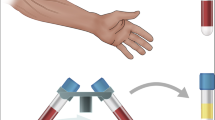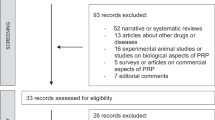Abstract
Peyronie’s Disease (PD) is characterized by fibrotic plaques in the penile tunica albuginea, causing curvature and painful erections. Current treatments have limited established efficacy. Platelet-Rich Plasma (PRP), known for modulating inflammation, offers a potential alternative. This randomized, placebo-controlled, crossover study at the University of Miami assesses PRP’s safety and efficacy for PD. Forty-one PD patients were randomized into PRP-placebo (Group A) and placebo-PRP (Group B) sequences, receiving two injections of each treatment over three months, with a crossover to receive two injections of alternate treatment over the next three months. Assessments include pain scale, goniometry, questionnaires, and curvature evaluations. Preliminary analysis of 28 patients shows that PRP is safe. There were no adverse events, including penile complications, during follow-up. Pain scores during treatments showed no significant difference between PRP and placebo (p = 0.52). Over six months, the PRP-Placebo group’s median PDQ score decreased from 1.9 (IQR: 1.7–2.9) to 1.4 (IQR: 0.7–2.1). This change was not statistically significant (p = 0.098). In contrast, the Placebo-PRP group showed a significant reduction from 1.8 (IQR: 1.4–2.6) to 1.2 (IQR: 1.0–2.0) (p = 0.020). No significant changes in IIEF scores were observed. Both groups initially had a median penile curvature of 40 degrees. At 3 months, the PRP-Placebo group’s curvature decreased to 38 degrees (IQR: 35–47.5), while the Placebo-PRP group decreased to 35 degrees (IQR: 30–60). At 6 months, the PRP-Placebo group showed a significant reduction to 25 degrees (IQR: 20–40, p = 0.047), while the Placebo-PRP group’s reduction to 32.5 degrees (IQR: 20–50) was not significant (p = 0.490). These early results indicate a delayed PRP effect, prompting further investigation into its long-term impacts. Although limited by sample size, this study suggests PRP injections as a safe treatment for PD, with ongoing research aiming to clarify its therapeutic value.
This is a preview of subscription content, access via your institution
Access options
Subscribe to this journal
Receive 8 print issues and online access
$259.00 per year
only $32.38 per issue
Buy this article
- Purchase on Springer Link
- Instant access to full article PDF
Prices may be subject to local taxes which are calculated during checkout

Similar content being viewed by others
References
Brady L, Stender CJ, Wang YN, Schade GR, Maxwell AD, Wessells H, et al. Mechanical characterization of fibrotic and mineralized tissue in Peyronie’s disease. Int J Impot Res. 2022;34:477–86. https://doi.org/10.1038/s41443-021-00439-2.
American Urological Association. Peyronie’s Disease Guideline. 2021. Retrieved from https://www.auanet.org/guidelines/peyronies-disease-guideline.
European Association of Urology. Sexual and Reproductive Health - Penile Curvature. 2022. Retrieved from https://uroweb.org/guideline/sexual-and-reproductive-health/#6.
Zugail, AS, Alshuaibi, M, Lombion, S, Beley, S. Safety and feasibility of percutaneous needle tunneling with platelet-rich plasma injections for Peyronie’s disease in the outpatient setting: a pilot study. Int J Impot Res. 2023. https://doi.org/10.1038/s41443-023-00744-y.
Achraf C, Ammani AP, El Anzaoui J. Platelet-rich plasma in patients affected with Peyronie’s disease. Arab J Urol. 2022;21:69–75. https://doi.org/10.1080/2090598X.2022.2135284.
Karakose A, Yitgin Y. A new alternative approach to management of acute phase Peyronie’s disease: low-intensity extracorporeal shockwave therapy and platelet-rich plasma. Minerva Urol Nephrol. 2023. https://doi.org/10.23736/S2724-6051.23.05458-7.
Schirmann A, Boutin E, Faix A, Yiou R. Tolerance and efficacy of platelet-rich plasma injections in Peyronie’s disease: pilot study. Prog Urol. 2022;32:856–61. https://doi.org/10.1016/j.purol.2022.05.004.
Hellstrom WJ, Feldman R, Rosen RC, Smith T, Kaufman G, Tursi J. Bother and distress associated with Peyronie’s disease: validation of the Peyronie’s disease questionnaire. J Urol. 2013;190:627–34. https://doi.org/10.1016/j.juro.2013.01.090.
Rosen RC, Riley A, Wagner G, Osterloh IH, Kirkpatrick J, Mishra A. The international index of erectile function (IIEF): a multidimensional scale for assessment of erectile dysfunction. Urology. 1997;49:822–30. https://doi.org/10.1016/s0090-4295(97)00238-0.
Virag R, Sussman H, Lambion S, de Fourmestraux V. Evaluation of the benefit of using a combination of autologous platelet rich-plasma and hyaluronic acid for the treatment of Peyronie’s disease. Sex Health Issues. 2017;1:1–8. https://doi.org/10.15761/SHI.1000102.
Funding
This work was supported by NIH Grant R01 DK130991, UE5DK137308, and Clinician Scientist Development Grant from the ACS to RR.
Author information
Authors and Affiliations
Contributions
BRL, DAV, CE, MM, EI, FC, NAD, SH, IMR, RS, and RR prepared the manuscript and figures. All authors approved the submitted manuscript.
Corresponding author
Ethics declarations
Competing interests
The authors declare no competing interests.
Additional information
Publisher’s note Springer Nature remains neutral with regard to jurisdictional claims in published maps and institutional affiliations.
Supplementary information
Rights and permissions
Springer Nature or its licensor (e.g. a society or other partner) holds exclusive rights to this article under a publishing agreement with the author(s) or other rightsholder(s); author self-archiving of the accepted manuscript version of this article is solely governed by the terms of such publishing agreement and applicable law.
About this article
Cite this article
Ledesma, B.R., Velasquez, D.A., Egemba, C. et al. A phase 2 randomized, placebo-controlled crossover trial to evaluate safety and efficacy of platelet-rich plasma injections for Peyronie’s disease: clinical trial update. Int J Impot Res (2024). https://doi.org/10.1038/s41443-024-00844-3
Received:
Revised:
Accepted:
Published:
DOI: https://doi.org/10.1038/s41443-024-00844-3



